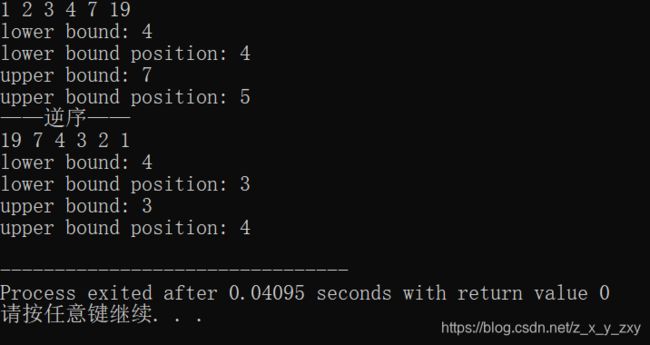- 异常检测的评价指标:ROCAUC等【tips】
太简单了
tips计算机视觉深度学习pytorch
准确率Precision&召回率Recallfromsklearn.metricsimportprecision_recall_curveprecision,recall,thresholds=precision_recall_curve(gt_mask.flatten(),scores.flatten())混淆矩阵:实际预测正负正TP(真正类)FN(假负类)负FP(假正类)TN(真负类)prec
- vjudge平台提交不了or核实自己的账号小tips
木木三420号
c++bug
如图,如果出现以上类似情况,去到相应网站,用自己的账号登录后,按下F12.找到应用程序,或者application,在左侧找到cookies点开在相对应的网址上就有vj上需要的uid之类的。希望能帮助到大家
- 论C++和Python哪个更优越(一)
UnwaterBreathing
C++PythonC++菜鸟教程c++开发语言python
一.前言C++,C语言的2.0版本,开发语言中的一把利剑Python,多种开发语言的结晶,代码界的后起之秀----------------------------------------------------------------------它们两个到底谁更强?今天我将从多个角度给你分析.TIPS:以下内容仅个人观点,可能会不全面,不喜勿喷.速度速度,是判定一个开发语言很不错的标准1.C++我
- 【Python Tips】多线程池加速独立运行程序——ThreadPoolExecutor
机器白学
Pythonpython
在处理数量庞大的数据集或者大批量的循环操作时,程序如果单一运行往往会十分缓慢。假如硬件设备内存足够,CPU性能够好,同时每次循环内的任务都独立(如访问一个文件夹内大量文件)。这种时间复杂度的问题可以尝试使用多线程来处理加速。下面记录使用Python标准库中的高级接口——concurrent.futures.ThreadPoolExecutor来实现多线程加速。以一个写入txt文件的操作为例,假如有
- MurmurHash Tips(qbit)
pythonjavahash
简介MurmurHash是一种非加密型哈希函数(Non-cryptographichashfunction),适用于一般的哈希检索操作。与其它流行的哈希函数相比,对于规律性较强的key,MurmurHash的随机分布特征表现更良好。常见的MD5、SHA1是加密型哈希函数(Cryptographichashfunction)Hash算法评价杨保华《区块链·原理、设计与应用》第5章密码学与安全技术中讲
- Scrum 四个会议及正确召开方式
程序员
敏捷开发有一些重要的实践方法,可以帮助团队更快地适应敏捷开发框架。这些方法不能简单照搬执行,比如,只在瀑布开发模式下中加入Scrum的四个会议,这无法让瀑布团队转成敏捷团队。敏捷转型需要深入理解概念和思维,团队才能更好的进行实践。下面我们了解一下Scrum的四个会议,并思考它们如何正确打开并推动敏捷研发。Tips:有一些方法来自Scrum,Scrum是一种持续迭代、且有固定时长的敏捷框架。这些方法
- Faiss Tips:高效向量搜索与聚类的利器
焦习娜Samantha
FaissTips:高效向量搜索与聚类的利器faiss_tipsSomeusefultipsforfaiss项目地址:https://gitcode.com/gh_mirrors/fa/faiss_tips项目介绍Faiss是由FacebookAIResearch开发的一个用于高效相似性搜索和密集向量聚类的库。它支持多种硬件平台,包括CPU和GPU,能够在海量数据集上实现快速的近似最近邻搜索(AN
- Python精选200Tips:121-125
AnFany
Python200+Tipspython开发语言
Spendyourtimeonself-improvement121Requests-简化的HTTP请求处理发送GET请求发送POST请求发送PUT请求发送DELETE请求会话管理处理超时文件上传122BeautifulSoup-网页解析和抓取解析HTML和XML文档查找单个标签查找多个标签使用CSS选择器查找标签提取文本修改文档内容删除标签处理XML文档123Scrapy-强大的网络爬虫框架示例
- 学习小组Day4笔记—蓝海松茶
蓝海松茶LHSC
一、下载安装R和Rstudio1.下载安装RGoogle搜索https://mirrors.tuna.tsinghua.edu.cn/CRAN/选择匹配自己电脑的安装包下载安装一直点下一步,直到安装完成Tips确认自己电脑的用户名是英文名,若不是,请修改2.下载安装RstudioGoogle搜索https://www.rstudio.com/products/rstudio/download/下载
- 全面的弹出框提示框插件资源指南
BOBO爱吃菠萝
本文还有配套的精品资源,点击获取简介:在IT领域,用户界面设计中的弹出框和提示框是关键元素,它们能够有效传达信息与引导用户。本资源汇集了多种类型的弹出框和提示框插件,如artDialog、ymprompt4.0、thickbox、poshytip和colortips,提供给开发者在网页或应用程序中实现多样化交互体验的工具。这些插件各有特色,包括自定义样式、拖拽功能、全屏展示、定位提示以及色彩展示等
- Unity协程搭配队列开发Tips弹窗模块
傻Q爱
Unity技术unityjava游戏引擎
概述在Unity游戏开发过程中,提示系统是提升用户体验的重要组成部分。一个设计良好的提示窗口不仅能及时传达信息给玩家,还应当做到不干扰游戏流程。本文将探讨如何使用Unity的协程(Coroutine)配合队列(Queue)数据结构来构建一个高效且可扩展的Tips弹窗模块。技术模块介绍1.Unity协程(Coroutines)协程是Unity中的一种特殊函数类型,允许异步操作的实现。它能够在执行过程
- C++中变量声明与定义的规则
TOMOCAT
声明与定义分离Tips:变量能且仅能被定义一次,但是可以被多次声明。为了支持分离式编译,C++将定义和声明区分开。其中声明规定了变量的类型和名字,定义除此功能外还会申请存储空间并可能为变量赋一个初始值。extern如果想声明一个变量而非定义它,就使用关键字extern并且不要显式地初始化变量:externinti;//声明i而非定义iexterninti=1;//定义i,这样做抵消了extern的
- 在PostgreSQL中使用JSONB对象数组
weixin_26750481
javapython
数据库提示(DatabaseTips)Inmylastarticle,wefocusedonturningaPostgreSQLjsonbcolumn,thatcontainedanArrayofObjects,intoarecordset,sothatitcouldbequeriedinarelationalmanner.在我的上一篇文章中,我们专注于将包含对象数组的PostgreSQLjson
- 减肥tips
雨桐Nikki
姨妈期体重姨妈期体重会有些上下浮动,不要担心哦~1、通常女生在姨妈期是体重会增加1到2公斤,这种体重只是暂时的,所以大家不要太担心,在姨妈结束之后,体重就会很快恢复到以前的状态,想要减肥的小伙伴,可以好好利用姨妈结束后的一星期进行瘦身,这时是瘦身的黄金时期,新陈代谢的速度比较快,但是在姨妈期间,一定要保存正常的饮食,不然会导致月经不调的情况出现喔。2、通常姨妈时间正常的是七天左右,有的女生会感觉当
- C - Word Ladder题解
Digital_Enigma
这是题解C++c语言word开发语言动态规划大数据算法c++
C-WordLadder题解解题思路:先输入两个字符串S和t然后在S和T中寻找有多少个字符不同的个数(也就是需要变换多少次)开始替换时:tips:字符串下标以0开始我们定义两个变量a和b,用于记录当前遍历到的字符首先是判断:如果这时a已经==b了,那么就跳过,不用管;如果a大于b的话:那么我们就让s中的第i项替换成b,接着就直接输出S就行了。这样输出可以免了还要搞个string类数组去存一大堆东西
- 烘焙食谱丨父爱般的奶酪饼干!
陈大仙儿
奶酪饼干表皮焦黄喷香,饼干松香绵酥,朴素简单的外表却蕴含着足以令味蕾温软的味道。奶酪饼干用料十分的简单,也没有复杂的步骤,做出来的成品漂亮。在整形的部分必须要花点心思。接下来就开始今天的教学吧。材料:黄油120g,低筋面粉245g,蛋黄3个,鸡蛋4个,糖粉90g,奶油奶酪100g,盐2g步骤:1.把3个鸡蛋分出蛋黄后备用2.将120g黄油和100g奶油奶酪提前软化,用电动打蛋器打发至蓬松Tips:
- 打造专属 Docker 私有仓库 ——Harbor 配置全攻略
刘大帅ps
docker容器运维linux云原生服务器
重新机子配IP到搭建docker私有仓库harbor过程tips:想跟大家分享一下在配置的过程中遇到问题后怎么处理。首先是一定不要慌,也不要气馁,冷静下来,理清思路。可以和同学或者网上看看他们做的思路,在跟自己的思路碰撞。方向对了,就找找基础的指令有没有配置问题,排除了这些之后。还是不行就要考虑reboot,以及重新配置。正常一般都可以了。还是不行就要考虑自己的方法对不对了。希望大家不要对自己的实
- 【刷题笔记】打家劫舍问题
破晓的历程
笔记动态规划算法
欢迎来到破晓的历程的博客⛺️不负时光,不负己✈️题目一题目链接:打家劫舍I思路小偷每到一初,都可以选择对这个位置偷还是不偷,所以,这次我们需要定义两个表小Tips:针对这种情况,一般上都需要定义两个dp表,因为每一个位置我们都可以选择。状态表示:f[i]:表示第i家小偷偷,得到的总金额。g[i]:表示第i家小偷不偷,得到的总金额。状态转移方程f[i]:f[i]=g[i-1]+nums[i]。第i家
- vuedose.tips(翻译系列二十三)
知识文青
UsingScopedSlotsinVue.js我多次认识到想要在Vue.js进行编码时如何提高生产力这是一个过于开放的问题,但是至少可以通过以下方式实现这一点:确定他们在应用程序中经常构建的功能,然后拥有可重用组件的工具包,使您可以在其中放置通用逻辑,同时又足够灵活适应其他应用。Vue.js带有插槽以使组件具有可重新定义的结构,但它们本身的功能非常有限。有时您需要一些数据或状态来定义组件应如何呈
- 2022-07-26 Manage your energy, not your time
春生阁
Energyisthecurrencyofmotivation.Mostoftheproductivityandhabitbuildingadviceyouhearofferstipsandtricksforbettertimemanagement.Withpromisesofmakingyoumoreefficientinyourwork,theysuggestallsortsoftechniq
- Python自用存档 - 列表tips
Venassa佳
Pythonpython开发语言
目录目录1新建的list里面的文本内容记得用引号包起来2sort与sorted区别3为什么不能直接print括号里加append4格式化format的两个写法foriinoffer_list:5用join函数,把列表转换为字符串6利用range()建列表,运用在循环节7pop()默认末尾出;del8用IF判断列表是否为空9在列表增元素,append、extend、insert1新建的list里面的
- Python Tips and Tricks
net sec
1.InstallPythonintoWindows1.1DownloadLatestPython2filefromhttps://www.python.org/downloads/windows/LatestPython3Release–Python3.7.0LatestPython2Release–Python2.7.151.2DoubleClickdownloadpython-2.7.15.
- mysql查询之”使用索引“
AmBestToday
#DBmysqloracle数据库
项目场景:使用sql查询,但是速度非常慢(百万级数据量)问题描述使用sql查询,如果不走索引的话,速度非常慢原因分析:解决方案:tips:了解一下”主键索引”主键和主键索引在数据库中有着特定的含义和用途。主键(PrimaryKey)是用于唯一标识数据库表中每一条记录的字段或字段组合。2.1.它确保记录的唯一性,不允许出现重复值,也不允许为空。2.2.主键约束确保了数据的唯一性和完整性,是数据库设计
- 要在面试中赢地漂亮,你得知道面试官在想什么
职场专谈
今天的主题依然是面试,依旧干货满满,依旧双眼诚恳地建议收藏阅读。本文会教你如何在面试中赢地漂亮,分两个部分:一个以面试者的角度,告诉你面试时的致命加分点;一个以公司的角度,告诉你在面试时公司到底在考验你什么?你的dreamcompany,从下面的正文开始。一当你面试时最基础最基本的,无非以下几个tips:1.简历简洁明了,突出中心和重点内容。2.绩点成绩/GPA高/语言证明(说明学习能力强)3.着
- react中使用threejs小试牛刀
cnmone
reactjs
搭建本地开发环境安装nodejs按照CreateReactApp安装指南创建一个新的项目npxcreate-react-appreact-three-demo删除掉新项目中src/文件夹下的所有文件。(不要删除整个src文件夹,删除里面的源文件。)安装路由依赖包和threejs依赖包#tips:注意版本兼容问题npminstallreact-router@5react-router-dom@5np
- 华为 流策略—PBR
期待未来的男孩
路由交换路由
需求:两条ISP线路可以访问server配置:在防火墙在SNAT将源地址替换成防火墙出接口地址网关在交换机上切默认路由丢给防火墙在交换机上配置PBR,将ISP2访问server的流量在会给路由器并设置内网的流量不走PBRaclnumber3005 rule15permitipsource192.168.1.10destination172.21.0.00.0.255.255aclnumber301
- 贝佐斯如何开会
小艾科技Yige
什么情况下要开会——怎么准备会议资料——几种常见的会议开法——亚马逊开会方法的基石-领导力准则——会议瘦身Tips
- Performance Tips
ngugg
相关链接:https://developer.apple.com/library/archive/documentation/FileManagement/Conceptual/FileSystemProgrammingGuide/PerformanceTips/PerformanceTips.html#//apple_ref/doc/uid/TP40010672-CH7-SW1Relativet
- 秋冬内搭很重要,9种搭配不同外套,简单又有气质
巧百搭
秋冬搭配,人们往往将重点放在外套上面,而忽略了那些非常重要的内搭设计。对于冬季来说,内搭真的非常重要。因为大部分的地区室内环境下都是具有一定的取暖方式,所以需要在室内脱下外套,这个时候就非常考验内搭了。外套美美的,而内搭丑丑的,那么必然会留下一个遗憾,所以如果想要变美,那么我们就需要精致到内搭设计,今天就来为大家介绍九种内搭,分别适合搭配不同的外套。Tips1:灰紫色毛衣+蓝色牛仔裤,时髦又休闲,
- 最新Vmware17的WIn10虚拟机开箱即用,免安装
码码哈哈0.0
有趣资源实用工具windows
这篇文章分享的Vmware安装Win10的教程,如过有些懒得装Win10的同学可以会直接使用我的WIn10镜像压缩包打开即可Win10镜像压缩包下载tips:⬆️⬆️包含Vmware17安装包使用方法,打开Vmware
- Nginx负载均衡
510888780
nginx应用服务器
Nginx负载均衡一些基础知识:
nginx 的 upstream目前支持 4 种方式的分配
1)、轮询(默认)
每个请求按时间顺序逐一分配到不同的后端服务器,如果后端服务器down掉,能自动剔除。
2)、weight
指定轮询几率,weight和访问比率成正比
- RedHat 6.4 安装 rabbitmq
bylijinnan
erlangrabbitmqredhat
在 linux 下安装软件就是折腾,首先是测试机不能上外网要找运维开通,开通后发现测试机的 yum 不能使用于是又要配置 yum 源,最后安装 rabbitmq 时也尝试了两种方法最后才安装成功
机器版本:
[root@redhat1 rabbitmq]# lsb_release
LSB Version: :base-4.0-amd64:base-4.0-noarch:core
- FilenameUtils工具类
eksliang
FilenameUtilscommon-io
转载请出自出处:http://eksliang.iteye.com/blog/2217081 一、概述
这是一个Java操作文件的常用库,是Apache对java的IO包的封装,这里面有两个非常核心的类FilenameUtils跟FileUtils,其中FilenameUtils是对文件名操作的封装;FileUtils是文件封装,开发中对文件的操作,几乎都可以在这个框架里面找到。 非常的好用。
- xml文件解析SAX
不懂事的小屁孩
xml
xml文件解析:xml文件解析有四种方式,
1.DOM生成和解析XML文档(SAX是基于事件流的解析)
2.SAX生成和解析XML文档(基于XML文档树结构的解析)
3.DOM4J生成和解析XML文档
4.JDOM生成和解析XML
本文章用第一种方法进行解析,使用android常用的DefaultHandler
import org.xml.sax.Attributes;
- 通过定时任务执行mysql的定期删除和新建分区,此处是按日分区
酷的飞上天空
mysql
使用python脚本作为命令脚本,linux的定时任务来每天定时执行
#!/usr/bin/python
# -*- coding: utf8 -*-
import pymysql
import datetime
import calendar
#要分区的表
table_name = 'my_table'
#连接数据库的信息
host,user,passwd,db =
- 如何搭建数据湖架构?听听专家的意见
蓝儿唯美
架构
Edo Interactive在几年前遇到一个大问题:公司使用交易数据来帮助零售商和餐馆进行个性化促销,但其数据仓库没有足够时间去处理所有的信用卡和借记卡交易数据
“我们要花费27小时来处理每日的数据量,”Edo主管基础设施和信息系统的高级副总裁Tim Garnto说道:“所以在2013年,我们放弃了现有的基于PostgreSQL的关系型数据库系统,使用了Hadoop集群作为公司的数
- spring学习——控制反转与依赖注入
a-john
spring
控制反转(Inversion of Control,英文缩写为IoC)是一个重要的面向对象编程的法则来削减计算机程序的耦合问题,也是轻量级的Spring框架的核心。 控制反转一般分为两种类型,依赖注入(Dependency Injection,简称DI)和依赖查找(Dependency Lookup)。依赖注入应用比较广泛。
- 用spool+unixshell生成文本文件的方法
aijuans
xshell
例如我们把scott.dept表生成文本文件的语句写成dept.sql,内容如下:
set pages 50000;
set lines 200;
set trims on;
set heading off;
spool /oracle_backup/log/test/dept.lst;
select deptno||','||dname||','||loc
- 1、基础--名词解析(OOA/OOD/OOP)
asia007
学习基础知识
OOA:Object-Oriented Analysis(面向对象分析方法)
是在一个系统的开发过程中进行了系统业务调查以后,按照面向对象的思想来分析问题。OOA与结构化分析有较大的区别。OOA所强调的是在系统调查资料的基础上,针对OO方法所需要的素材进行的归类分析和整理,而不是对管理业务现状和方法的分析。
OOA(面向对象的分析)模型由5个层次(主题层、对象类层、结构层、属性层和服务层)
- 浅谈java转成json编码格式技术
百合不是茶
json编码java转成json编码
json编码;是一个轻量级的数据存储和传输的语言
在java中需要引入json相关的包,引包方式在工程的lib下就可以了
JSON与JAVA数据的转换(JSON 即 JavaScript Object Natation,它是一种轻量级的数据交换格式,非
常适合于服务器与 JavaScript 之间的数据的交
- web.xml之Spring配置(基于Spring+Struts+Ibatis)
bijian1013
javaweb.xmlSSIspring配置
指定Spring配置文件位置
<context-param>
<param-name>contextConfigLocation</param-name>
<param-value>
/WEB-INF/spring-dao-bean.xml,/WEB-INF/spring-resources.xml,
/WEB-INF/
- Installing SonarQube(Fail to download libraries from server)
sunjing
InstallSonar
1. Download and unzip the SonarQube distribution
2. Starting the Web Server
The default port is "9000" and the context path is "/". These values can be changed in &l
- 【MongoDB学习笔记十一】Mongo副本集基本的增删查
bit1129
mongodb
一、创建复本集
假设mongod,mongo已经配置在系统路径变量上,启动三个命令行窗口,分别执行如下命令:
mongod --port 27017 --dbpath data1 --replSet rs0
mongod --port 27018 --dbpath data2 --replSet rs0
mongod --port 27019 -
- Anychart图表系列二之执行Flash和HTML5渲染
白糖_
Flash
今天介绍Anychart的Flash和HTML5渲染功能
HTML5
Anychart从6.0第一个版本起,已经逐渐开始支持各种图的HTML5渲染效果了,也就是说即使你没有安装Flash插件,只要浏览器支持HTML5,也能看到Anychart的图形(不过这些是需要做一些配置的)。
这里要提醒下大家,Anychart6.0版本对HTML5的支持还不算很成熟,目前还处于
- Laravel版本更新异常4.2.8-> 4.2.9 Declaration of ... CompilerEngine ... should be compa
bozch
laravel
昨天在为了把laravel升级到最新的版本,突然之间就出现了如下错误:
ErrorException thrown with message "Declaration of Illuminate\View\Engines\CompilerEngine::handleViewException() should be compatible with Illuminate\View\Eng
- 编程之美-NIM游戏分析-石头总数为奇数时如何保证先动手者必胜
bylijinnan
编程之美
import java.util.Arrays;
import java.util.Random;
public class Nim {
/**编程之美 NIM游戏分析
问题:
有N块石头和两个玩家A和B,玩家A先将石头随机分成若干堆,然后按照BABA...的顺序不断轮流取石头,
能将剩下的石头一次取光的玩家获胜,每次取石头时,每个玩家只能从若干堆石头中任选一堆,
- lunce创建索引及简单查询
chengxuyuancsdn
查询创建索引lunce
import java.io.File;
import java.io.IOException;
import org.apache.lucene.analysis.Analyzer;
import org.apache.lucene.analysis.standard.StandardAnalyzer;
import org.apache.lucene.document.Docume
- [IT与投资]坚持独立自主的研究核心技术
comsci
it
和别人合作开发某项产品....如果互相之间的技术水平不同,那么这种合作很难进行,一般都会成为强者控制弱者的方法和手段.....
所以弱者,在遇到技术难题的时候,最好不要一开始就去寻求强者的帮助,因为在我们这颗星球上,生物都有一种控制其
- flashback transaction闪回事务查询
daizj
oraclesql闪回事务
闪回事务查询有别于闪回查询的特点有以下3个:
(1)其正常工作不但需要利用撤销数据,还需要事先启用最小补充日志。
(2)返回的结果不是以前的“旧”数据,而是能够将当前数据修改为以前的样子的撤销SQL(Undo SQL)语句。
(3)集中地在名为flashback_transaction_query表上查询,而不是在各个表上通过“as of”或“vers
- Java I/O之FilenameFilter类列举出指定路径下某个扩展名的文件
游其是你
FilenameFilter
这是一个FilenameFilter类用法的例子,实现的列举出“c:\\folder“路径下所有以“.jpg”扩展名的文件。 1 2 3 4 5 6 7 8 9 10 11 12 13 14 15 16 17 18 19 20 21 22 23 24 25 26 27 28
- C语言学习五函数,函数的前置声明以及如何在软件开发中合理的设计函数来解决实际问题
dcj3sjt126com
c
# include <stdio.h>
int f(void) //括号中的void表示该函数不能接受数据,int表示返回的类型为int类型
{
return 10; //向主调函数返回10
}
void g(void) //函数名前面的void表示该函数没有返回值
{
//return 10; //error 与第8行行首的void相矛盾
}
in
- 今天在测试环境使用yum安装,遇到一个问题: Error: Cannot retrieve metalink for repository: epel. Pl
dcj3sjt126com
centos
今天在测试环境使用yum安装,遇到一个问题:
Error: Cannot retrieve metalink for repository: epel. Please verify its path and try again
处理很简单,修改文件“/etc/yum.repos.d/epel.repo”, 将baseurl的注释取消, mirrorlist注释掉。即可。
&n
- 单例模式
shuizhaosi888
单例模式
单例模式 懒汉式
public class RunMain {
/**
* 私有构造
*/
private RunMain() {
}
/**
* 内部类,用于占位,只有
*/
private static class SingletonRunMain {
priv
- Spring Security(09)——Filter
234390216
Spring Security
Filter
目录
1.1 Filter顺序
1.2 添加Filter到FilterChain
1.3 DelegatingFilterProxy
1.4 FilterChainProxy
1.5
- 公司项目NODEJS实践0.1
逐行分析JS源代码
mongodbnginxubuntunodejs
一、前言
前端如何独立用nodeJs实现一个简单的注册、登录功能,是不是只用nodejs+sql就可以了?其实是可以实现,但离实际应用还有距离,那要怎么做才是实际可用的。
网上有很多nod
- java.lang.Math
liuhaibo_ljf
javaMathlang
System.out.println(Math.PI);
System.out.println(Math.abs(1.2));
System.out.println(Math.abs(1.2));
System.out.println(Math.abs(1));
System.out.println(Math.abs(111111111));
System.out.println(Mat
- linux下时间同步
nonobaba
ntp
今天在linux下做hbase集群的时候,发现hmaster启动成功了,但是用hbase命令进入shell的时候报了一个错误 PleaseHoldException: Master is initializing,查看了日志,大致意思是说master和slave时间不同步,没办法,只好找一种手动同步一下,后来发现一共部署了10来台机器,手动同步偏差又比较大,所以还是从网上找现成的解决方
- ZooKeeper3.4.6的集群部署
roadrunners
zookeeper集群部署
ZooKeeper是Apache的一个开源项目,在分布式服务中应用比较广泛。它主要用来解决分布式应用中经常遇到的一些数据管理问题,如:统一命名服务、状态同步、集群管理、配置文件管理、同步锁、队列等。这里主要讲集群中ZooKeeper的部署。
1、准备工作
我们准备3台机器做ZooKeeper集群,分别在3台机器上创建ZooKeeper需要的目录。
数据存储目录
- Java高效读取大文件
tomcat_oracle
java
读取文件行的标准方式是在内存中读取,Guava 和Apache Commons IO都提供了如下所示快速读取文件行的方法: Files.readLines(new File(path), Charsets.UTF_8); FileUtils.readLines(new File(path)); 这种方法带来的问题是文件的所有行都被存放在内存中,当文件足够大时很快就会导致
- 微信支付api返回的xml转换为Map的方法
xu3508620
xmlmap微信api
举例如下:
<xml>
<return_code><![CDATA[SUCCESS]]></return_code>
<return_msg><![CDATA[OK]]></return_msg>
<appid><
